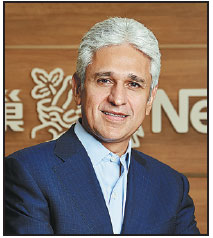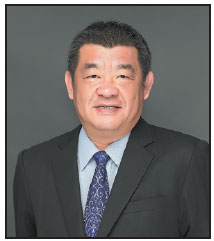Foreign firms to see broader market access
Editor's Note: The Government Work Report released on March 5 has charted a course for China's economic development for this year. By setting fairly robust growth targets, the country is set to be the locomotive pulling the world economy amid global economic headwinds. A number of pro-growth efforts have been unveiled to spur innovation and continue opening-up. The country has also released the Foreign Investment Law to better protect the rights of foreign businesses in China. China Daily polled senior executives from multinational corporations to understand their positioning, perception and predictions of the Chinese market.
Q1: The year 2019 marks the 70th anniversary of the founding of the People's Republic of China. What in your opinion are China's biggest achievements to date? What are the biggest achievements made by your company so far?
Q2: China's economic growth moderated to 6.6 percent last year as it shifted its focus to high-quality growth. How does your "China strategy" fit into the new trend?
Q3: What are your views on the Foreign Investment Law? How will China's ongoing efforts to further open up the economy and protect the legitimate interests of foreign companies help your business in China?
Q4: China is committed to high-quality manufacturing and the government has stressed the importance of technological innovation. What do Chinese companies need to move up the value chain?
Q5: What are your views on the government's ongoing efforts to cut red tape and enhance work efficiency?

Benedikt Sobotka,
CEO of Eurasian Resources GroupA1 As the world's second-biggest economy and the largest merchandise trader, China now plays a crucial role in global economic development.
Since we started our engagement with China, we have made great inroads in the space of sales and project cooperation. China accounts for 20 to 25 percent of ERG's total sales volume, which consists of ferroalloys, cobalt, copper and iron ore. With the guidance of China's opening-up strategies including the Belt and Road Initiative, ERG's collaboration with China takes many forms, including EPC (engineering, procurement and construction), financing, off-take agreements, and equity partnerships.
A2 China represents a longstanding, key market for ERG, both in terms of mineral products sales and project cooperation. We are positive about the future of our business in China because of the country's strong rate of development growth, its stable economic environment and, most important of all, the significant opportunities it continues to provide.
Since China has shifted its focus to high-quality growth, a large number of technologically advanced enterprises have entered the market. ERG is one of the largest suppliers of ferrochrome and cobalt to China, which are materials of the future that are key to China's transition to a more consumer-driven economy and the transformation of its growth pattern.
A3 The law emphasizes the promotion, protection and management of foreign investment. It will lead to a more attractive business environment for foreign companies through its measures around the protection of intellectual property. It will also lessen the burden on business to report information, enhance the conditions necessary for fair competition and broaden market access. The open and fair business environment China has established brings a range of benefits for us. China's prudent opening-up strategies, its rapidly developing economy, as well as the respect placed on foreign companies facilitating business in China yield more opportunities for cooperation with Chinese businesses.
A4 To promote China's transition, Chinese companies need to upgrade the value chain. As the core of the real economy, the manufacturing industry needs to shift its focus from quantity to quality in order to raise its competitiveness.
The improvement of the value chain can be furthered through the technological advancement of products as well as the supply chain through innovation and the use of big data.
A5 In recent years, the Chinese government has implemented numerous, effective measures to reduce red tape both in terms of people's daily lives as well as industrial and commercial activities. We are encouraged by such efforts, the result of which is a reduction in unnecessary processes that enables us to conduct our business in China more efficiently.

Rachel Duan,
senior vice-president of GEA1 Since the founding of the People's Republic of China, and especially since its reform and opening-up, China has lifted over 700 million people out of poverty, and the quality of life and services across sectors has improved dramatically. GE has enjoyed rapid development and cultivated strong local capabilities in R&D, manufacturing as well as sales and services on the Chinese mainland for the past 40 years. Today, GE China has over 16,000 employees, 30 manufacturing bases, and more than 30 joint ventures, with a presence across 40 cities in the country.
A2 China's economy has entered a critical transition period. Under the guidance of the "new development" concept, the dramatic changes taking place in China represent huge opportunities for future development. Our strategies of localization, partnership and digitization are poised to take advantage of these changes.
Meanwhile, GE's businesses in China are aligned with China's "mega-needs" in the years to come. This includes a power market that is expected to grow at an annual rate of nearly 5 percent until 2020, all while moving toward clean energy and natural gas; a healthcare market expected to grow as the number of people above 65 years will hit 170 million by 2020; and an air travel sector that is expected to make China the largest aviation market by passenger flow within 10 to 15 years.
A3 We believe that an integrated Foreign Investment Law will be a significant improvement and a crucial step forward for China as it moves toward further openness in legislation. We are happy that the law clearly stipulates that foreign enterprises will receive "pre-establishment national treatment", in addition to a "negative list system for market access". The law covers significant ground regarding national treatment and intellectual property rights, which are of great concern to foreign-invested enterprises.
A4 Sustainable growth in today's world requires every business to possess local capabilities inside a global footprint. At GE China, we have focused on investing in our people, processes and technologies to expand our localization efforts throughout the value chain, so we can design, manufacture, and service our products closer to our customers. For over a decade in China, GE has developed strong R&D capabilities. GE's innovation centers in Chengdu, Xi'an, and Harbin, as well as R&D centers in Beijing, Tianjin and Wuxi allow us to customize innovation for local customer requirements.
A5 In recent years, we are pleased to see that the Chinese government has given full consideration to the development needs of different market entities in China. By constantly deepening reform in free trade zones, establishing and improving the negative list, reforming and streamlining regulations on foreign investment, and adopting a service-oriented mindset, the government has given strong support to foreign enterprises like GE to develop in China.

William Yu,
president of Honeywell ChinaA1 During the past 70 years, the "China miracle" is unprecedented and unique in world history. China had an annual growth rate of 9.5 percent between 1978 and 2018. Reform and opening-up have injected strong vitality into China's economic growth.
Honeywell has become an integral part of China's economy. From China's largest petrochemicals project to the maiden flight of the first Chinese-made large passenger plane C919, from the Hong Kong-Zhuhai-Macao Bridge to the first China International Import Expo, Honeywell has been a strong supporter.
A2 China has transformed its economic development model from chasing speed to improving quality in recent years. We believe it has the potential to enjoy further success as the mega trends toward urbanization, mobility and digitization continue.
Honeywell will continue to implement our "East for East, East to Rest" and "Becoming the Chinese Competitor" strategies to develop innovative products, services and software solutions that produce energy efficiency and reliability, safety and comfort, productivity and sustainability. We look forward to continuing to serve our valued customers in China.
A3 Honeywell applauds any efforts to foster technology cooperation across borders and protection for intellectual property rights. We believe the Foreign Investment Law has the potential to boost transparency, build trust and encourage foreign investment in key sectors of China's economy.
With increasing openness and a more energetic business environment, China will play a bigger role in the growth of multinationals like Honeywell.
A4 We are happy to see that Chinese enterprises have made great achievements in innovation, especially in the digital field.
In the future, it is important for Chinese enterprises to focus on management to move up their value chain. Honeywell has accumulated rich experience in management. For example, the Honeywell Excellence System, which is a proved excellent management system based on Lean and Six Sigma, can help Chinese companies improve their performance and competitive edge.
A5 Cutting red tape and enhancing work efficiency is beneficial to the long-term development of China. We would like to see policies that improve productivity and foster transparency as favorable to the business environment in general and good for all companies that do business in and with China.

Allan Gabor,
president of Merck ChinaA1 The Chinese people lead much better lives today than 70 years ago, and on average they live much longer. This, to me, is the biggest achievement since the founding of the People's Republic of China.
Merck, as a company from Germany, is proud to have played a part in this over the decades. For example, we operate a modern pharmaceutical factory in Nantong, Jiangsu province, which produces drugs on China's Essential Drug List. They are quite affordable. It is our way to support the Chinese government in further prolonging and improving the lives of its citizens.
A2 We are a vibrant science and technology company, strong in life science and performance materials, in addition to healthcare.
We work with drug manufacturers to help bring new drugs to the market faster. In 2017, we launched an end-to-end bio development center in Shanghai. It reinforces our position as the premier supplier of all process development and clinical stage manufacturing solutions, materials and services needed for the production of biologics.
A3 I understand that stronger protection of intellectual property rights in China is one of the highlights of the Foreign Investment Law. As a science and technology company, Merck is holding more than 2,000 patents with relevance for the production of displays alone. Creating a positive and holistic intellectual property ecosystem, including patent review and enforcement, will stimulate innovation. Merck is pleased to see great progress in these areas.
All in all, the law is meant to be a unified law to provide stronger legal protection for foreign investors in China, which should increase their confidence in the long run.
A4 High quality "Made in China" means a lot to us. In 2017 alone, we placed 1.4 billion euros ($1.59 billion) worth of orders with Chinese suppliers.
At Merck, quality is embedded in everything we do. We have the latest quality systems in our sites, such as the Nantong pharmaceuticals manufacturing and Shanghai display materials manufacturing sites, bringing consistent quality medicines and reliable electronics and display materials to customers.
I know China is prioritizing quality. In the healthcare sector, for example, the country is conducting bio equivalence tests for generic equivalence and has increased focus on inspections.
In our view, high-quality manufacturing needs both a robust quality system and quality "culture", which could go hand in hand for continuous improvement.
A5 Merck has direct dialogues with a number of local governments in China, because we have manufacturing, R&D and innovation sites in Shanghai, Beijing, Suzhou, Nantong, Wuxi and Guangzhou. We appreciate such strong support from local governments for our business development. These dialogues are helpful for us, and we would like to have more of them.

Rashid Qureshi,
chairman and CEO of Nestle ChinaA1 As one of the first foreign companies to enter the Chinese market, Nestle brings delicious products and health concepts to the Chinese people, and at the same time enjoys common prosperity with the domestic economic development.
As a member of the unique process of reform and opening-up, we feel deeply honored and also a sense of responsibility. Nestle was one of the first multinational companies to grasp these opportunities, with the construction of a milk district and a dairy factory in the 1980s. "Creating shared value" has always been Nestle's business philosophy. Nestle believes that the business will be successful in the long term by creating value for both shareholders and society as a whole. This way of doing business is aligned with Nestle's purpose to enhance quality of life and contribute to a healthier future.
This approach has enabled Nestle China to grow in tandem with China's transformation. China is now the second-largest market of the Nestle Group. Nestle China employs about 40,000 people and operates 33 factories. Just about every product category Nestle has elsewhere in the world is also manufactured and sold in China. In addition, Nestle serves the diverse and ever-changing needs of Chinese consumers through popular local brands like Totole, Hsu Fu Chi and Yinlu.
A3 The Foreign Investment Law is an important measure of China to further implement its opening-up strategy. First of all, with three laws merged into one, various requirements and standards for foreign-invested enterprises have been unified, making it easier for foreign investors to understand China's foreign investment access system and requirements, which marks a big step forward in facilitating investment. Second, the previous approval policy for foreign investment has been replaced by the current filing system, which greatly simplifies the process of foreign enterprises entering and operating in China and creates a more favorable investment environment. Third, the law will strengthen the protection of intellectual property rights of enterprises investing in China.
A4 China's policies to improve living standards and promote imports and consumption policy undoubtedly provide Nestle with a brand-new development platform, which can greatly enrich Nestle's locally produced products, bring more nutritious and healthy food in the world to Chinese consumers, and better meet consumer needs.
To pay tribute to the reform and opening-up and the Chinese spirit, Nestle will continue making unremitting efforts for the health of the Chinese people and for China's economic development. Nestle will continue producing nutritious and healthy food to improve the quality of life of consumers and contribute to a healthier future.

Su Hua,
president of Infineon Technologies ChinaA1 China has transformed into the second-largest economy in the world, creating a strong consumer base as well as a leading industrial base. Today, it is setting many global trends when it comes to driving innovation and digital transformation, such as e-mobility, e-commerce and mobile payment.
Over the years of development, we have established three manufacturing facilities, three R&D centers, 22 joint labs and have more than 4,000 granted and pending patents in China. Our semiconductor solutions are an indispensable part of Chinese people's lives, enabling smart mobility, efficient energy management and the secure capture and transfer of data.
A2 China's economy has been transitioning from a phase of rapid growth to one of sustainable development. Sustainability is also core to Infineon's business, as we target value creation through profitable sustainable growth. Infineon has been included in the Dow Jones Sustainability World Index? for the fourth time, ranking among the top 10 percent of the most sustainable companies in the world.
In China, we launched our "Win with China" strategy. We help our local partners to innovate and transform in the digital era. Most importantly, we contribute to their business sustainability with innovative semiconductor solutions that achieve more and consume less.
A3 The new Foreign Investment Law demonstrates China's determination to open its doors wider and create a level playing field for foreign investors. Infineon has been partnering with China for almost 20 years and is a beneficiary of the country's ongoing efforts in reform and opening-up. The China market has become Infineon's growth engine, with our business in China contributing to 34 percent of Infineon's revenue in the fiscal year of 2018.
A4 As a leader in semiconductor technology, Infineon has a "smart manufacturing" solution that is committed to empowering manufacturers to digitalize manufacturing processes and boost industrial competitiveness.
The solution, focusing on trusted security solutions, advanced sensing, cross-application control and efficient power management, will pave the way for manufacturers to connect all sites across the world to form a virtual smart factory and optimize their production and entire value chain in real time.
A5 In this rapidly evolving world, businesses need to respond quickly and effectively to market trends, and simplified government procedures will help provide the support that they need, stimulate market vitality and encourage investment.
(China Daily 03/22/2019 page9)


















